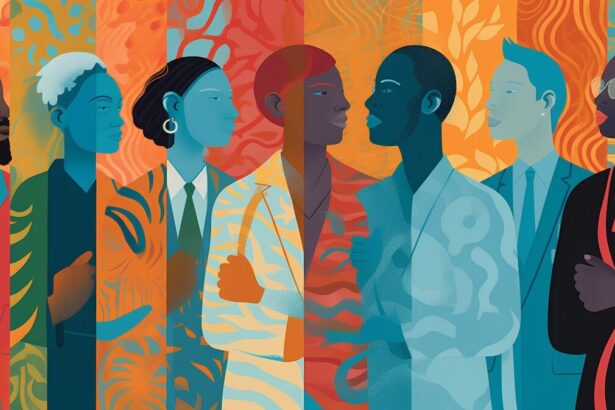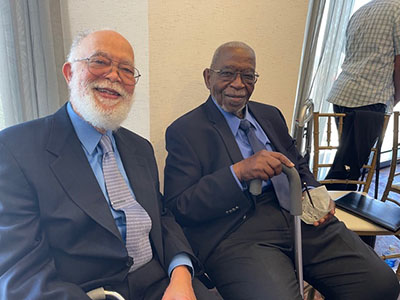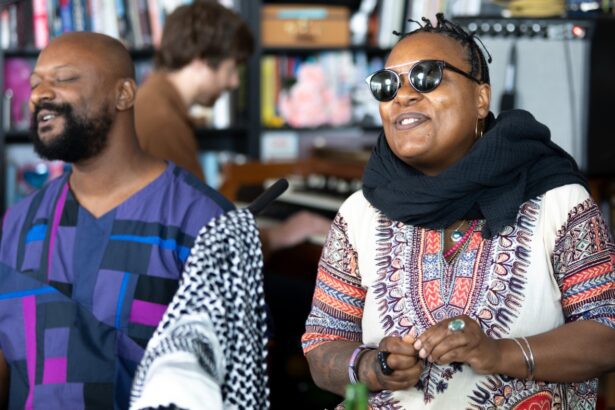When John Rickford (Stevenson, ‘71, sociolinguistics) arrived at the University of California, Santa Cruz in 1968, the fledgling three-year-old campus was small, scrappy, bold, and adventurous, with a student body of only 1,800.
At UC Santa Cruz, Rickford, this year’s Humanities Distinguished Undergraduate Alumni Award honoree, became the first person to earn an undergraduate degree in sociolinguistics, the study of the relationship between language and society and the ways in which people use language in different social contexts.
Rickford’s time at UC Santa Cruz also prepared the groundwork for his long and distinguished career as a linguistics professor at Stanford University, where he taught for 40 years until his retirement five years ago. He is also a high-profile advocate for the rights of vernacular language speakers.
Humanities Dean Jasmine Alinder will present Rickford with this award on June 6 at the Humanities Division’s annual Celebrating the Humanities: Spring Awards ceremony next Thursday from 4-7pm at the Santa Cruz Museum of Art & History in downtown Santa Cruz.
“This prestigious award recognizes extraordinary Humanities graduates who have done exemplary work in diverse fields, while exemplifying our core values of social justice and inclusion,” Alinder said.
She called attention to Rickford’s unique combination of rigorous scholarship, generosity, advocacy, activism, and his interdisciplinary approach to problem-solving.
“In his long and distinguished career, John Rickford has explored the various ways in which issues surrounding language connect to education, discrimination and criminal justice,” Alinder said. “And he’s made a lasting contribution to Civil Rights, from leading the UC Santa Cruz Black Student Association during his time here on campus to hosting Rosa Parks’s historic visit to Stanford University in 1990.”
A strong commitment to justice
Rickford, the author of more than 15 book-length scholarly works and a well-received memoir, Speaking My Soul: Race, Life and Language (Routledge, 2022) specialized in Activist Sociolinguistics, a sub-area that he helped to create.
Activist Sociolinguistics uses linguistics as a lens to confront the prejudice that people who use vernacular language all over the world face in their daily lives.
It may apply most readily in the United States to varieties such as African American Vernacular English (AAVE), Chicano English and other vernacular varieties of English, but it may apply in other countries to any languages or dialects whose speakers are misunderstood, disregarded or disparaged in reference to education, housing, or the law because of the varieties they speak, Rickford said.
Often, in the United States, these vernacular English speakers find themselves at an unfair disadvantage in the court system and wind up being misjudged as guilty or having their testimonies belittled or disregarded because of the non-standard varieties of English they speak, Rickford said.
Rickford worked with Rachel Jeantel, a good friend of Trayvon Martin, whose testimony was an important part of the prosecution’s case against George Zimmerman, who gunned down Martin in 2013. Rickford contends that the jury in that case discredited and ignored Jeantel’s testimony because of her use of vernacular English. The Black Lives Matter movement was founded in 2013 in response to Zimmerman’s exoneration.
Aside from standing up for the right of vernacular speakers to be heard, Rickford also celebrates the unique beauty and cadences of Black Talk.
In an essay on the subject, Rickford quoted the celebrated author and essayist James Baldwin, who once described black English as “this passion, this skill . . . this incredible music.”
Rickford also referenced the Nobel Prize-winning author Toni Morrison, who spoke of the essential role of Black Talk in her fiction. “It is the thing that Black people love so much — the saying of words, holding them on the tongue, experimenting with them, playing with them,” Morrison said. “It’s a love, a passion. Its function is like a preacher’s: to make you stand up out of your seat, make you lose yourself and hear yourself.’’
A life-changing mentorship and a sense of camaraderie
John Rickford was born in Guyana, the youngest of ten children. When he arrived in UC Santa Cruz, Rickford was coping with the profound sense of displacement he experienced after arriving in the United States.
At the time, Rickford had to negotiate a new identity from “colored” or “mixed race” in Guyana to “Black” in the U.S.
In that time of dislocation, Rickford soon found a generous mentor and father figure in the legendary sociologist, author and activist J. Herman Blake, who is now a Professor Emeritus of Sociology at UC Santa Cruz.
Blake was also the Founding Provost of Oakes College and the renowned co-writer of Revolutionary Suicide by the late Black Panthers leader Huey P. Newton, who received his Ph.D. in UC Santa Cruz’s History of Consciousness Department in 1980.
In his freshman year, Rickford took Blake’s course on Ethnic and Status Groups. It was a revelatory experience. “The content of the course was amazing, and Blake also made us each try to find out from our parents about our own genealogy, which was incredibly important for me,” Rickford said.
“Finally, Professor Blake gave me the huge privilege of serving as his teaching assistant when he taught his ‘Ethnic and Status Groups’ course at Mills College,” Rickford recalled.
“We would drive to Oakland from Santa Cruz, talking all the time, and back again,” Rickford recalled. “I learned so much from him in the process, and regarded him as a kind of father figure, especially since my dad had died in Guyana in 1969, and I couldn’t afford to fly back home for his funeral.”
During his time at UC Santa Cruz, Rickford also had immersive hands-on research experiences that influenced his future career path. He was part of a cohort of students who went on a research trip to the South Carolina Sea Islands for a quarter working among the speakers of the English-Creole based language known as Gullah on Daufuskie Island. He was amazed by the uncanny similarities between their Gullah variety of Black Talk among African-American populations in coastal Georgia and South Carolina and his own native Guyanese Creole.
Forging his own academic path
Another of Rickford’s life-changing mentors was Professor of Anthropology Roger Keesing, who was affiliated with Stevenson College and was a renowned expert on linguistics as well as cultural anthropology.
In 1971, Rickford received his BA with highest honors in sociolinguistics from UC Santa Cruz. After graduating, Rickford received a Danforth Fellowship, which allowed him to get his PhD in Linguistics from the University of Pennsylvania. While in graduate school, he wrote a 600-page thesis that took him right back to his childhood home, focusing on phonological and grammatical variations in Guyanese Creole personal pronouns.
These days, Rickford is considered a pioneer in the field of Activist Sociolinguistics, which makes use of both quantitative and non-qualitative approaches to linguistics studies.
He won a Dean’s Award for distinguished teaching in 1984 and a Bing Fellowship for excellence in teaching in 1992.
Rickford is looking forward to returning to campus to accept his latest honor.
“I am deeply honored and extremely humbled,” Rickford said. “UCSC made me who I am.”
The Humanities Division continues to honor John Rickford’s pioneering work and influence through the Department of Linguistics’s John Rickford Undergraduate Development Fund, which recognizes his “distinguished intellectual achievements and for his unstinting commitment to marginalized communities and the languages that they speak.”
The Fund provides new academic opportunities for distinguished undergraduates by supporting research projects, travel to conferences, and undergraduate linguistics club activities.




